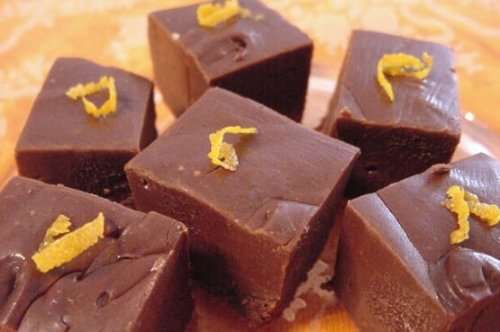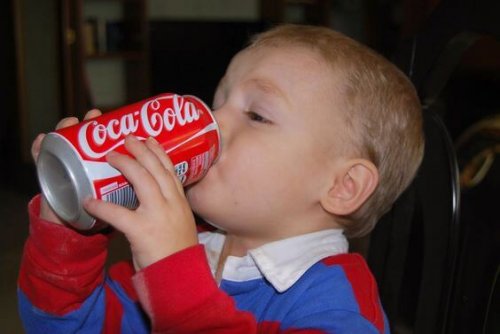More Than 8 Reasons Not to Give Caffeine to Children

Most parents would never think of it, some others don’t care. The truth is that there are plenty of reasons not to give caffeine to children. However, the vast majority forget that many foods and soft drinks contain this plant-based substance.
Specialists indicate that it’s advisable to reduce caffeine consumption as much as possible in the case of children. In Canada, children of preschool age are recommended not to ingest more than 45 milligrams of caffeine per day, which is equivalent to the amount contained in a 355-milliliter can of cola.
There are many reasons not to give your child caffeine, but to start with, you should consider that this substance has unhealthy stimulant and diuretic properties for children. Also, according to the US National Institutes of Health, caffeine is rapidly absorbed and passes through the brain.
Consequently, specialists speak of excitation of the central nervous system, an incorrect growth of the child, a loss of minerals capable of affecting bone mass, and even addiction. However, there are many side effects of this drug found in coffee, soda, ice cream, or chocolate.
Caffeine in children
As we’ve mentioned before, caffeine stimulates the central nervous system and, at low doses, gives people energy while making them alert. However, it can be said that the following are some reasons not to give caffeine to children, as an excess of consumption causes:
- Restlessness and nervousness
- Lack of concentration and loss of attention
- Difficulty falling asleep
- Acceleration of heart rate
- Increased blood pressure
- Gastritis and upset stomach
- Damage to the enamel of the teeth
- Headache
- Causes increased diuresis
- Sometimes it affects speech and normal motor activity
- Affects bone health
- Leads to dependency
Now, pay special attention to this list! You should note that in the case of young children, it’s not necessary to consume large amounts of caffeine for its intake to trigger these effects.

Are there other reasons not to give caffeine to children?
While the succinctly stated reasons may seem overboard or exaggerated, the reality is that they represent only the tip of the iceberg, as there’s an even broader range of reasons why you shouldn’t give caffeine to children.
1. Increases the risk of obesity
It’s estimated that those children who, even without knowing it, consume caffeine while drinking one or more soft drinks daily that contain 355 ml of sugar, whether cola or otherwise, are 60% more likely to be obese.
A recent study showed that the consumption of caffeinated foods in children increases the intake of sugars and calories. In turn, it decreases the intake of key nutrients such as protein and fiber. In this way, caffeine is an important marker to consider in childhood obesity.
2. Caffeine produces nutritional deficiencies
Caffeinated beverages often contain empty calories, meaning they don’t provide the nutrients needed for proper development. While children require a balanced diet that includes protein, whole grains, fruits, and vegetables.
Unfortunately, many kids fill up on soda without getting the vitamins and minerals they need, increasing the likelihood of nutritional deficiencies. At the same time, they may not get the calcium they need to build strong, healthy bones and teeth.
Furthermore, this stimulant inevitably leads to a decreased appetite and inadvisable nutrition in general.

3. Increases the possibility of having cavities
If your child drinks too many caffeinated and sugary beverages, they’ll be more likely to develop cavities due to a weakening of the teeth that brings about a greater erosion of the tooth enamel caused by its acidity.
A publication in the journal BMC Obesity demonstrated the negative effect sugary drinks have on children’s health. Among the main consequences of its consumption are the development of dental cavities and obesity, as well as the probability of presenting insulin resistance.
4. Dehydration
Another reason not to give your child caffeine is that this drug is also a diuretic. This diuretic effect is achieved by binding to the adenosine receptors of the renal afferent arteriole and increasing glomerular filtration, according to some studies. Therefore, it can sometimes contribute to dehydration.
In this way, pediatricians especially advise against excessive caffeine consumption on hot days because in this case, children must replace the water they lose in the form of sweat.
5. Bone loss
Precisely because it acts as a diuretic, caffeine leads to the loss of calcium in the body through the urine, according to some research. This results in a loss of bone mass, as this substance also tends to filter calcium from the body.
Doctors estimate that for every 100 mg of caffeine, 6 mg of calcium is lost, essential for bone growth in every growing child. In fact, a recent study showed that consumption of caffeine-containing products is also associated with reduced intestinal calcium absorption.
6. Addiction and withdrawal
Indeed, one reason not to give your child caffeine is that it creates dependency in those who regularly ingest it, according to multiple studies, even if they take it moderately. This dependency has similar symptoms in adults and children: Lethargy, irritability, and difficulty thinking clearly.
Consequently, if you suddenly stop your little one’s caffeine intake, you may notice withdrawal symptoms such as headaches, muscle aches, temporary depression, and irritability. This happens especially and is accentuated in those minors accustomed to consuming large amounts of this substance.
7. Insomnia
As has been tirelessly said, children between the ages of 5 and 12 require at least 11 hours of sleep per day. However, caffeine tends to increase their energy levels during the day, which helps reduce the hours of sleep needed, as this substance lasts at least 8 hours in the child’s body.
8. Hyperactivity and behavioral problems
Another reason not to give caffeine to children is that it leads to hyperactivity and causes behavioral problems, in addition to causing some restlessness and inability to concentrate. Also, the effects of this drug have negative effects on relationships with peers, studies, and grades.
Regarding the behavior of children, it’s possible to perceive that they become anxious and nervous. In fact, a study published in 2020 showed that chronic coffee or tea intake leads to increased alertness or anxiety.
Not giving your child caffeine is the best option
As you can see, caffeine consumption has multiple negative consequences for children, so it’s best not to give this substance to your child. It’s important to take into account that, in addition to coffee and tea, soft drinks also contain large amounts of caffeine, so their consumption should be limited.
Most parents would never think of it, some others don’t care. The truth is that there are plenty of reasons not to give caffeine to children. However, the vast majority forget that many foods and soft drinks contain this plant-based substance.
Specialists indicate that it’s advisable to reduce caffeine consumption as much as possible in the case of children. In Canada, children of preschool age are recommended not to ingest more than 45 milligrams of caffeine per day, which is equivalent to the amount contained in a 355-milliliter can of cola.
There are many reasons not to give your child caffeine, but to start with, you should consider that this substance has unhealthy stimulant and diuretic properties for children. Also, according to the US National Institutes of Health, caffeine is rapidly absorbed and passes through the brain.
Consequently, specialists speak of excitation of the central nervous system, an incorrect growth of the child, a loss of minerals capable of affecting bone mass, and even addiction. However, there are many side effects of this drug found in coffee, soda, ice cream, or chocolate.
Caffeine in children
As we’ve mentioned before, caffeine stimulates the central nervous system and, at low doses, gives people energy while making them alert. However, it can be said that the following are some reasons not to give caffeine to children, as an excess of consumption causes:
- Restlessness and nervousness
- Lack of concentration and loss of attention
- Difficulty falling asleep
- Acceleration of heart rate
- Increased blood pressure
- Gastritis and upset stomach
- Damage to the enamel of the teeth
- Headache
- Causes increased diuresis
- Sometimes it affects speech and normal motor activity
- Affects bone health
- Leads to dependency
Now, pay special attention to this list! You should note that in the case of young children, it’s not necessary to consume large amounts of caffeine for its intake to trigger these effects.

Are there other reasons not to give caffeine to children?
While the succinctly stated reasons may seem overboard or exaggerated, the reality is that they represent only the tip of the iceberg, as there’s an even broader range of reasons why you shouldn’t give caffeine to children.
1. Increases the risk of obesity
It’s estimated that those children who, even without knowing it, consume caffeine while drinking one or more soft drinks daily that contain 355 ml of sugar, whether cola or otherwise, are 60% more likely to be obese.
A recent study showed that the consumption of caffeinated foods in children increases the intake of sugars and calories. In turn, it decreases the intake of key nutrients such as protein and fiber. In this way, caffeine is an important marker to consider in childhood obesity.
2. Caffeine produces nutritional deficiencies
Caffeinated beverages often contain empty calories, meaning they don’t provide the nutrients needed for proper development. While children require a balanced diet that includes protein, whole grains, fruits, and vegetables.
Unfortunately, many kids fill up on soda without getting the vitamins and minerals they need, increasing the likelihood of nutritional deficiencies. At the same time, they may not get the calcium they need to build strong, healthy bones and teeth.
Furthermore, this stimulant inevitably leads to a decreased appetite and inadvisable nutrition in general.

3. Increases the possibility of having cavities
If your child drinks too many caffeinated and sugary beverages, they’ll be more likely to develop cavities due to a weakening of the teeth that brings about a greater erosion of the tooth enamel caused by its acidity.
A publication in the journal BMC Obesity demonstrated the negative effect sugary drinks have on children’s health. Among the main consequences of its consumption are the development of dental cavities and obesity, as well as the probability of presenting insulin resistance.
4. Dehydration
Another reason not to give your child caffeine is that this drug is also a diuretic. This diuretic effect is achieved by binding to the adenosine receptors of the renal afferent arteriole and increasing glomerular filtration, according to some studies. Therefore, it can sometimes contribute to dehydration.
In this way, pediatricians especially advise against excessive caffeine consumption on hot days because in this case, children must replace the water they lose in the form of sweat.
5. Bone loss
Precisely because it acts as a diuretic, caffeine leads to the loss of calcium in the body through the urine, according to some research. This results in a loss of bone mass, as this substance also tends to filter calcium from the body.
Doctors estimate that for every 100 mg of caffeine, 6 mg of calcium is lost, essential for bone growth in every growing child. In fact, a recent study showed that consumption of caffeine-containing products is also associated with reduced intestinal calcium absorption.
6. Addiction and withdrawal
Indeed, one reason not to give your child caffeine is that it creates dependency in those who regularly ingest it, according to multiple studies, even if they take it moderately. This dependency has similar symptoms in adults and children: Lethargy, irritability, and difficulty thinking clearly.
Consequently, if you suddenly stop your little one’s caffeine intake, you may notice withdrawal symptoms such as headaches, muscle aches, temporary depression, and irritability. This happens especially and is accentuated in those minors accustomed to consuming large amounts of this substance.
7. Insomnia
As has been tirelessly said, children between the ages of 5 and 12 require at least 11 hours of sleep per day. However, caffeine tends to increase their energy levels during the day, which helps reduce the hours of sleep needed, as this substance lasts at least 8 hours in the child’s body.
8. Hyperactivity and behavioral problems
Another reason not to give caffeine to children is that it leads to hyperactivity and causes behavioral problems, in addition to causing some restlessness and inability to concentrate. Also, the effects of this drug have negative effects on relationships with peers, studies, and grades.
Regarding the behavior of children, it’s possible to perceive that they become anxious and nervous. In fact, a study published in 2020 showed that chronic coffee or tea intake leads to increased alertness or anxiety.
Not giving your child caffeine is the best option
As you can see, caffeine consumption has multiple negative consequences for children, so it’s best not to give this substance to your child. It’s important to take into account that, in addition to coffee and tea, soft drinks also contain large amounts of caffeine, so their consumption should be limited.
All cited sources were thoroughly reviewed by our team to ensure their quality, reliability, currency, and validity. The bibliography of this article was considered reliable and of academic or scientific accuracy.
- Alasmari F. Caffeine induces neurobehavioral effects through modulating neurotransmitters. Saudi Pharm J. 2020 Apr;28(4):445-451.
- American Academy of Child and Adolescent Psychiatry. Caffein and Children. Julio 2020.
- Benton J. M. Cafeína. Nemours Kids Health. Febrero 2017.
- Bleich SN, Vercammen KA. The negative impact of sugar-sweetened beverages on children’s health: an update of the literature. BMC Obes. 2018 Feb 20;5:6.
- Faros. Los efectos de la cafeína en los niños. Hospital Sant Joan de Déu. Octubre 2016.
- Heaney RP. Effects of caffeine on bone and the calcium economy. Food Chem Toxicol. 2002 Sep;40(9):1263-70.
- Jain S, Srivastava AS, Verma RP, Maggu G. Caffeine addiction: Need for awareness and research and regulatory measures. Asian J Psychiatr. 2019 Mar;41:73-75.
- Massey LK, Whiting SJ. Caffeine, urinary calcium, calcium metabolism and bone. J Nutr. 1993 Sep;123(9):1611-4.
- Marx B, Scuvée É, Scuvée-Moreau J, Seutin V et al. Mechanisms of caffeine-induced diuresis. Med Sci (Paris). 2016 May;32(5):485-90.
- McCormick DP, Reyna L, Reifsnider E. Calories, Caffeine and the Onset of Obesity in Young Children. Acad Pediatr. 2020 Aug;20(6):801-808.
- Lizarraga M. Consideraciones actuales sobre el consumo de café en la actividad física y el deporte. Atención Primaria. 2009; 41(12): 698-701.
- Torres Ugalde Y, Romero Palencia A, et al. Caffeina consumption in children: innocuous or deleterious? A systematic review. International Journal of Environmental Research and Public Health. Abril 2020. 17 (7): 2489.
This text is provided for informational purposes only and does not replace consultation with a professional. If in doubt, consult your specialist.








